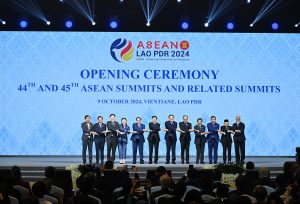Southeast Asian ministers will meet in Thailand later this month for talks on the ongoing civil war in Myanmar, as China makes more concerted efforts to shape the trajectory of the conflict.
Indonesia’s Foreign Ministry spokesperson Roy Soemirat told reporters yesterday that Laos, the current chair of the Association of Southeast Asian Nations (ASEAN), had invited the bloc’s foreign ministers to attend a meeting in Bangkok on December 20, the Jakarta Globe reported.
The meeting will seek out ways to resolve the civil war that has engulfed most of the country since the military coup of February 2021. Roy said that the talks will start with an informal meeting between members of the ASEAN troika alliance, which includes current chair Laos as well as Indonesia and Malaysia, the bloc’s last and next chairs, respectively.
“So the troika will have a meeting among themselves first on what’s happening in Myanmar,” he said. “After that, the other ASEAN members will join them in another round of discussion.”
Roy said that he did not know what issues the meetings would cover, but that it was likely it would cover the junta’s unpopular plans to host a general election in 2025.
“Indonesia’s stance on Myanmar has not changed,” he added. “We want to help Myanmar to return to normalcy.”
The meeting, which Thailand has previously billed as an “informal consultation,” will discuss how to implement ASEAN’s ill-fated Five-Point Consensus peace plan, which calls for an immediate cessation of violence in the country and inclusive dialogue involving “all parties” to the country’s conflict. The plan has been mostly moribund since its formulation in April 2021. Myanmar’s military junta has refused to heed the injunction to stop its attacks on resistance forces, which are now fighting back with increasing effectiveness; nor has it shown any willingness to engage in with “all parties” to the country’s conflict, instead branding them “terrorists” and seeking to eliminate them by force. (Resistance groups view the junta in much the same way.)
Ahead of the last ASEAN Summit in Vientiane in October, the bloc’s leaders condemned Myanmar’s efforts to achieve peace as “substantially inadequate.” They also condemned attacks on civilians and “urged all parties involved to take concrete action to immediately halt indiscriminate violence.”
The upcoming meeting reflects the Thai government’s attempts to play an elevated role in resolving the country’s conflict, in support of ASEAN’s broader efforts. During the ASEAN Summit, Prime Minister Paetongtarn Shinawatra said that “it is time to start talking,” and that Thailand “is ready to help.” Paetongtarn, who took office in September, met with Senior General Min Aung Hlaing, the leader of the junta, on the sidelines of 8th Greater Mekong Subregion Summit in Kunming, China.
How much impact the Bangkok meeting will have is debatable. For the past three years, ASEAN has wrestled with the question of how to implement the Consensus and has repeatedly butted up against the same problem: bound by its norm of consensus-based decision-making and its principle of non-interference, the bloc has little power to compel or punish the Myanmar military for refusing to implement Five-Point Consensus. At the same time, these principles have also prevented it from jettisoning the Consensus, as some critics suggest, and adopting a more muscular solution to the country’s conflict.
Part of the problem is that neither side in Myanmar’s conflict has much interest in talking. In the nearly four years since the coup, Myanmar’s civil war, which includes a welter of pre-existing struggles for ethnic self-determination, has evolved into a zero-sum battle to determine the country’s future. With both sides viewing the other as anathema to any future political arrangements, the current prospects of negotiations remain dim.
However, the dynamics of the conflict are slowly changing following the junta’s precipitous recent losses and China’s subsequent decision to begin intervening more actively in the country’s conflict. Concerned that recent resistance gains may lead to the collapse of the junta, and the onset of fragmentation and anarchy, Beijing has boosted its support for the military regime in Naypyidaw and increased its pressure on powerful armed groups to abandon their offensives. Indeed, over the past week, two major armed groups in Shan State have announced unilateral ceasefires and an intention to restart China-brokered negotiations with the junta. At the same time, China’s government has also offered strong backing for the junta’s election plans, which it views as a possible beginning to an end to the civil war.
As the International Institute for Strategic Studies (IISS) argued in a briefing released this week, Beijing is supporting the election plan “in the hope that it will shake up the junta’s leadership dynamic and create new space for political maneuvering and conflict de-escalation.” It is here that an ASEAN venue could potentially play a valuable role. “But even if the possibility of dialogue comes into view,” the IISS added, “violence would likely need to escalate before either side agrees to meaningful negotiations.”

































